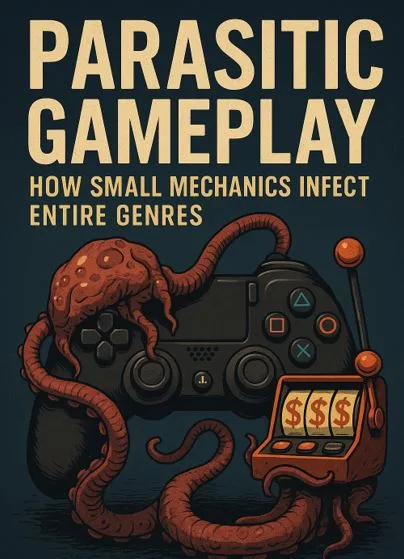Parasitic Gameplay: How Small Mechanics Infect Entire Genres
A Bug in the System
I still remember the first time I mastered the dodge-roll in Dark Souls. That flick of animation, with its perfect invincibility window, felt revolutionary. It became my safety net in every battle. But years later, while playing Horizon Forbidden West, I realized something unsettling—I was dodging again. Then in God of War Ragnarök. And in countless other titles. A mechanic that once felt fresh and deliberate had become an expectation.
This isn’t just about combat systems. Across the gaming industry, small mechanics spread like parasites—invading genres, reprogramming player behaviors, and subtly reshaping design philosophy. Some enrich the ecosystem. Others feed off it, leaving it weaker than before.
The Evolution of Gameplay Borrowing
In the early days of gaming, new mechanics were rare and celebrated. A game Super Mario 64 introduced analog stick-controlled movement and set the standard for 3D platformers. Today, risk-averse studios replicate proven features instead of innovating, creating a landscape where unique mechanics have turned into mandatory checkboxes for developers chasing broad audiences.
The spread of gambling-inspired features reflects this trend, with loot boxes, spin wheels and randomized rewards blurring the boundary between skill-based progression and chance. The model demonstrated by 7bitcasino shows how digital entertainment can captivate users through unpredictable reward systems, and many game developers have adopted comparable mechanics to maintain player engagement outside traditional gambling platforms.
As a result, countless titles replace the thrill of organic discovery with carefully engineered dopamine triggers, allowing borrowed ideas to dictate player experiences more than original creative vision.
Rogue-Lite’s Long March
Roguelike mechanics—permadeath, procedural generation, randomized loot—were once niche, beloved by hardcore players of Rogue or Spelunky. They felt dangerous, unpredictable, endlessly replayable. But fast-forward, and roguelite structures now infest everything from shooters (Returnal) to racing games (Death Road to Canada).
Replayability is up. Handcrafted levels are down. Carefully designed progression systems give way to randomness, creating an illusion of depth. Players often mistake unpredictability for innovation, and developers, eager to capitalize, replicate these mechanics without asking if they fit the core experience.
Souls-Style Dodges and Copy-Paste Combat
Dark Souls did more than deliver punishing difficulty; it birthed an iconic combat rhythm of dodges, parries, and stamina management. Today, these mechanics have spread everywhere. God of War, Horizon, Final Fantasy XVI—all embrace dodge-rolls, rewarding timing over positioning.
This isn’t evolution; it’s inertia. Developers reuse what players already know, banking on muscle memory. It feels safe. But over time, this erodes genre diversity, creating a homogeneous loop where the same mechanic, once innovative, becomes a crutch.
The Casino Inside Your Controller
Gambling mechanics have infiltrated mainstream games with alarming speed. Loot boxes, prize wheels, and randomized reward crates are no longer simple monetization tools; they have transformed into core systems that change how players engage. In FIFA Ultimate Team, people spend real money on packs, hoping to unlock rare athlete cards. Call of Duty connects cosmetic items and weapons to chance-based systems, creating an environment where skill is overshadowed by luck.
This approach mirrors digital casino platforms where unpredictable outcomes are used to sustain player interest. On 7bitcasino’s bonus page 7-bitcasino.com/bonus/, for example, promotions are designed to keep users engaged by offering extra spins and rewards that trigger anticipation and excitement.
The parallels become even clearer when reading real user experiences, like this Reddit story http://www.reddit.com/r/gambling/comments/1kwm9rm/my_7bit_casino_adventure_first_crypto_casino_and/ where a player describes how 7bitcasino’s design kept them invested for hours through a mix of crypto rewards and gamified incentives.
By implementing comparable systems, many modern video games are crossing the line between entertainment and behavior patterns found in online gambling environments.
Developers frequently argue that these features are harmless and optional. However, when core progression relies on randomized rewards and scarcity-driven events, players are nudged toward patterns of engagement that resemble the cycles found in gambling environments.
Casino Bonuses: The Dopamine Loop
At 7bitcasino, the bonus system is engineered to maximize player retention through layered rewards. New users are greeted with a welcome package that includes deposit matches and free spins, setting the tone for an experience where every action feels incentivized. Weekly reload bonuses and seasonal tournaments ensure there’s always something to chase, echoing how modern video games rely on daily quests and battle passes to keep players returning.
These bonus mechanics are not unlike the reward systems in video games that drip-feed players with randomized loot or cosmetic unlocks. Both create a cycle of anticipation and gratification, leveraging psychology to extend engagement far beyond the core experience.
Cryptocurrencies and Instant Gratification
In line with its modern approach, 7bitcasino supports a wide array of cryptocurrencies—including Bitcoin, Ethereum, and Litecoin—for deposits and withdrawals. Transactions are fast, often near-instant, and appeal to users looking for both privacy and convenience.
This integration of crypto mirrors trends in gaming, where virtual currencies and tokens increasingly mediate player progress. Whether it’s premium skins in multiplayer shooters or in-game currencies for gacha pulls, the line between entertainment ecosystems and financial transactions continues to blur.
Battle Pass: Symbiotic or Trojan Horse?
If loot boxes are the parasite’s darker side, Battle Pass systems might be its more symbiotic cousin. Fortnite popularized progression ladders tied to consistent play, and countless games have followed.
Battle Passes offer transparency. Players know what they’re earning. But they also transform games into seasonal ledgers. Instead of exploring or experimenting, players grind toward cosmetic rewards. Engagement becomes an obligation, not joy.
Even games that don’t need live-service models are shoehorning in daily quests and progression systems, reshaping their design around player retention rather than creative expression.
When Copying Fails
Not all parasitic mechanics thrive. When borrowed features clash with core gameplay, the result feels awkward.
- A Formula One simulator with unnecessary roguelike systems?
- A cheerful platformer bogged down by loot crate mechanics?
- A tactical RPG obsessed with dodge-roll combat despite slow, turn-based pacing?
These failures remind us that good mechanics don’t exist in isolation; they grow from a game’s narrative, pacing, and player expectations. Lift them carelessly, and they become dead weight.
Parasites of the Future
What’s next to infect the ecosystem?
- Micro-betting overlays: “Pay to predict if you’ll survive this wave.”
- Aggressive AI-driven monetization: boosters offered mid-match based on performance.
- AR pets in shooters, requiring real money to evolve.
Each starts as a novelty. Then, without resistance, it becomes a staple.
Resist the Parasite
Innovation doesn’t come from recycling mechanics until they lose all meaning. It comes from asking hard questions: does this feature serve the story, the skill curve, the world you’ve built?
For developers, the challenge is resisting the lure of safe design. For players, it’s noticing when engagement becomes compulsion. And for critics, it’s calling out patterns that flatten creativity in favor of easy metrics.
The best games feel alive because they surprise us. Parasitic mechanics can’t do that. They feed off innovation. They don’t create it.
So next time you roll through another dodge-heavy action sequence or spin a digital wheel, ask yourself: is this design… or just infection?




